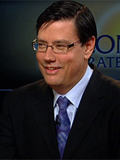“United States of ALEC” is an unprecedented in-depth television report on the most influential corporate-funded political force most of us have never heard of – ALEC, the American Legislative Exchange Council. A national consortium of state politicians and powerful corporations, ALEC presents itself as a “nonpartisan public-private partnership”. But behind that mantra lies a vast network of corporate lobbying and political action aimed to increase corporate profits at public expense.
Using interviews, documents, and personal accounts, the episode explores ALEC’s self-serving machine at work, acting in a way one Wisconsin politician describes as “a corporate dating service for lonely legislators and corporate special interests.”
 Arizona State Senator Steve Farley.
Arizona State Senator Steve Farley.
In state houses around the country, hundreds of pieces of boilerplate ALEC legislation are proposed or enacted that would, among other things, dilute collective bargaining rights, make it harder for some Americans to vote, and limit corporate liability for harm caused to consumers -- each accomplished without the public ever knowing who's behind it.
“All of us here are very familiar with ALEC and the influence that ALEC has with many of the [legislative] members,” said Arizona State Senator Steve Farley. “Corporations have the right to present their arguments, but they don’t have the right to do it secretly.”
"United States of ALEC" is a collaboration between Okapi Productions (the filmmakers Tom Casciato and Kathleen Hughes) and the Schumann Media Center, headed by Bill Moyers, which supports independent journalism and public watchdogs such as the Center for Media and Democracy, whose investigators are featured in the report.
Also appearing on the Moyers & Company broadcast is Kathleen Hall Jamieson, the director of the University of Pennsylvania’s Annenberg Public Policy Center and founder of FactCheck.org, who talks about deception and truth in the 2012 campaign.
Moyers & Company, Friday at 9 p.m on PBS 6.


By submitting your comments, you hereby give AZPM the right to post your comments and potentially use them in any other form of media operated by this institution.